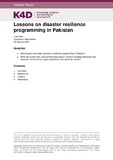Lessons on Disaster Resilience Pogramming in Pakistan
Abstract
This rapid literature review finds that lessons drawn from disaster resilience programmes in Pakistan are focused on the best ways to co-ordinate between different resilience work in different sectors. This can be difficult because of the number of NGOs with different sectoral expertise, short time frames for intervention, and the differing capacities of levels of Pakistani government. More generally, although the benefits of linking disaster risk reduction (DRR) to climate change adaptation (CCA) and development work are advocated in many policies, the fact that they are often undertaken by different actors limits synergies. The report also finds that most DRR work is focused on reducing risk from hazards rather than social vulnerabilities. Pakistan is vulnerable to climate change and a range of natural disasters. Following the earthquake in 2005 and floods in 2010, the Pakistani government and international donors have sought to increase the country's resilience to natural hazards. This literature review focuses on disaster risk reduction (DRR) efforts, as these constitute a significant portion of the resilience work in Pakistan. It first defines resilience, DRR and the related concept of CCA, as these all aim to improve resilience. It then surveys lessons learned in implementing resilience and DRR programmes in Pakistan. It focuses on lessons relating to sectoral focus, target populations, as well as strategic framework and operating models. It is mainly based on evaluations written by NGOs, UN bodies and international financial institutions. NGO reports are typically focused on specific programmes, although some point to broader features of the landscape for resilience programming in Pakistan. Academic papers charting the trends and issues in resilience programming have also been consulted.
Citation
Kelly, L. (2021). Lessons on disaster resilience programming in Pakistan. K4D Helpdesk Report 972. Brighton, UK: Institute of Development Studies. DOI: 10.19088/K4D.2021.057DOI
10.19088/K4D.2021.057Is part of series
K4D Helpdesk Report;972Rights holder
© Crown copyright 2021Sponsor
FCDO (Foreign, Commonwealth and Development Office)Collections
- K4D [937]

